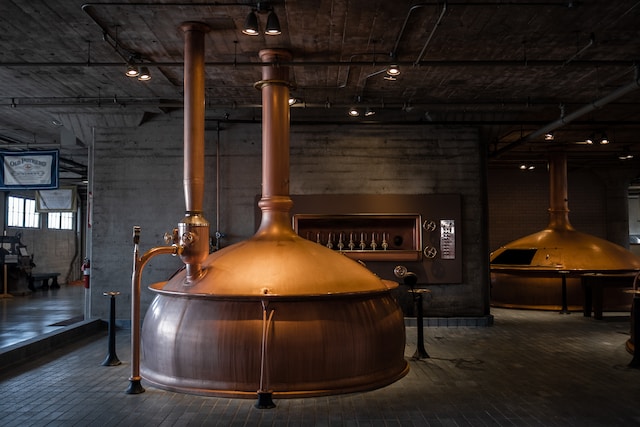Free Local Delivery over £25 within 10 miles from Shop in Hemel Hempstead | Free National Delivery over £60
The History And Origin Of Craft Beer

Craft beer has a rich and fascinating history that dates back thousands of years. If you’re a beer enthusiast, then understanding the origins of craft beer is essential to truly appreciate this beloved beverage.
The story begins with the ancient civilizations of Mesopotamia and Egypt, where brewing techniques were first developed around 5,000 BCE. These early brewers discovered that fermenting grains like barley produced a delicious and intoxicating drink – beer.
Fast forward to medieval Europe, where monasteries played a crucial role in the production and distribution of beer. Monks brewed their own beer as a way to sustain themselves during periods of fasting when solid food was prohibited.
But it wasn’t until the late 20th century that craft beer as we know it today began to take shape. In America, homebrewers started experimenting with unique flavors and styles, challenging the dominance of mass-produced lagers. This movement eventually spread across Europe and ignited what is now known as the Craft Beer Revolution.
As you delve into the fascinating history and origin of craft beer, prepare to be amazed by its deep roots and how it has evolved over time. From humble beginnings to becoming an art form cherished by enthusiasts worldwide, craft beer is a testament to human creativity and passion for brewing excellence.
The Origins of Brewing and Beer Production
The origins of brewing and beer production can be traced back to ancient civilizations, where the art of fermentation and the love for a good brew were already deeply ingrained in human history. Brewing techniques have evolved significantly over time, but the fundamental process of converting grains into alcohol remains unchanged. Ancient recipes provide insight into the early methods used to create beer, which often included ingredients like barley, wheat, and honey. These recipes varied across different cultures, with each civilization adding their unique flavors and spices to enhance their brews. As civilizations expanded and interacted with one another, knowledge about brewing spread, leading to advancements in techniques and the exchange of ideas. With this foundation established, let’s explore how these early traditions eventually paved the way for the rise of craft beer in Europe.
The Rise of Craft Beer in Europe
Despite its humble beginnings, the surge in popularity of small-batch brews has propelled a revolution in Europe’s beer industry. Craft beer festivals have become the epicenter for beer enthusiasts and curious drinkers alike, showcasing a wide variety of unique and innovative brews from across the continent. These festivals offer an immersive experience, allowing attendees to sample traditional European beer styles such as Belgian farmhouse ales, German lagers, and English bitters. The atmosphere is electric with excitement as brewers display their craftsmanship and share stories behind their creations.
The rise of craft beer in Europe has not only revitalized traditional brewing techniques but also fostered creativity and experimentation among brewers. With a focus on quality ingredients and artisanal methods, European craft breweries have successfully carved out their niche in an industry dominated by mass-produced beers. This explosion of craft beer culture in Europe laid the groundwork for its eventual spread to America.
Craft beer comes to America with its own set of unique challenges and opportunities.
Craft Beer Comes to America
With the introduction of small-batch brews from Europe, America’s beer industry experienced a transformative shift. The craft beer movement, which had gained momentum across the pond, began to take hold in America during the late 1970s and early 1980s. American breweries started experimenting with new flavors and brewing techniques, challenging the dominance of large commercial breweries. These independent brewers focused on quality and creativity, producing beers that were distinct and flavorful. They aimed to revive traditional brewing methods while also pushing boundaries with innovative ingredients and styles.
As the craft beer scene grew, so did consumer interest in locally-made, artisanal brews. People sought out these smaller breweries for their unique offerings and personalized experiences. This demand for craft beer paved the way for what would become known as the craft beer revolution.
Transitioning into the subsequent section about ‘the craft beer revolution,’ this period marked a turning point in American brewing history as it brought about significant changes in consumer tastes and preferences.
The Craft Beer Revolution
During this period of transformation, small breweries across America sparked a revolution that forever changed the way people think about and experience their favorite beverage. Microbreweries began popping up in cities and towns, offering a wide variety of unique and flavorful craft beers. These small-scale operations focused on quality rather than quantity, using traditional brewing techniques and locally sourced ingredients to create beers with distinct flavors and characteristics. To showcase their creations, microbreweries started hosting beer tasting events where enthusiasts could sample different styles and provide feedback directly to the brewers. This direct interaction between brewers and consumers fostered a sense of community around craft beer, further fueling its popularity. As the Craft Beer Revolution gained momentum, it paved the way for countless new breweries to open their doors, each contributing to the ever-expanding world of craft beer. Looking ahead, this movement shows no signs of slowing down as more people embrace the artistry behind every pint.
The Future of Craft Beer
Embrace the exciting future of artisanal brewing, where innovative flavors and creative collaborations transport you to a realm of sensory delight. The craft beer industry is constantly evolving, offering new innovation opportunities for both brewers and consumers alike. With an increasing demand for unique and experimental brews, breweries are pushing boundaries by incorporating unconventional ingredients like fruits, spices, or even coffee into their recipes. This constant pursuit of creativity keeps the craft beer scene fresh and exciting.
However, along with these innovation opportunities come sustainability challenges. As the popularity of craft beer continues to soar, breweries must address environmental concerns such as water usage and waste management. Many brewers are turning to sustainable practices like using renewable energy sources or implementing water conservation techniques to reduce their carbon footprint.
The future of craft beer is bright, filled with endless possibilities for flavor exploration and sustainable growth. So raise your glass and toast to the incredible journey that lies ahead in the ever-evolving world of craft beer. Cheers!





